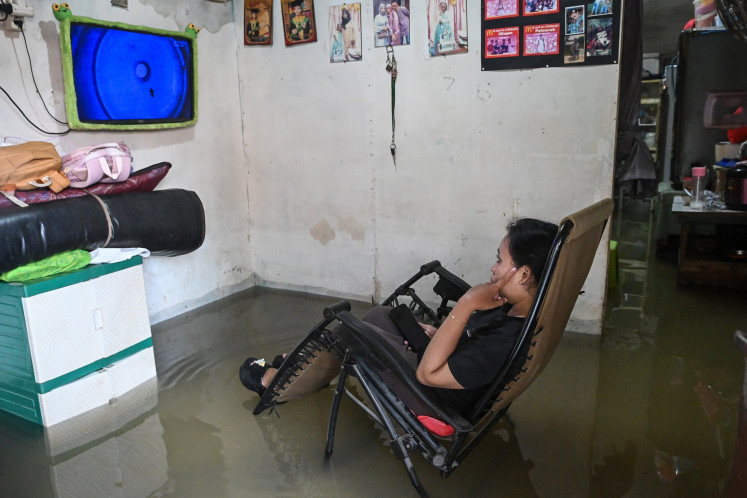Popular Reads
Top Results
Can't find what you're looking for?
View all search resultsPopular Reads
Top Results
Can't find what you're looking for?
View all search resultsEMR adoption at health facilities a necessity in the digital era
EMR streamlines patient care coordination, allows a standardized format for data sharing of medical information among healthcare professionals and potentially reduces errors in patient data management.
Change text size
Gift Premium Articles
to Anyone
In our rapidly digitalizing world, health care is at a turning point. Especially in Indonesia, with its dispersed islands and a vast network of over 60,000 healthcare facilities, the turn toward digital healthcare signifies a critical juncture.
The crux of this transformation is the adoption of electronic medical records (EMRs). However, this monumental shift presents notable challenges that need to be addressed alongside realizing the immense potential that digital health care carries for Indonesia's future.
The pandemic has fast-tracked the integration of technology and digitalization in health care over the past few years. Seven years before the pandemic, only 30 percent of Indonesian hospitals had a billing system. The inception of the Health Care and Social Security Agency's (BPJS Kesehatan) National Health Insurance (JKN) caused this number to rise to 50 percent.
As the pandemic unfolded, the need for digital solutions skyrocketed, leading to the implementation of billing systems in more than 80 percent of hospitals, according to a report from the Health Ministry.
During the physical distancing phase, telemedicine, health applications and EMRs emerged as indispensable tools in delivering efficient and effective healthcare services.
EMRs, in particular, bring numerous notable advantages. They streamline patient care coordination, allow a standardized format for data sharing of medical information among healthcare professionals and potentially reduce errors in patient data management.
In addition, EMRs also bolster patient safety, lower the risk of data negligence and encourage patient participation in health management.
Nevertheless, the path to implementing EMRs is strewn with complexities. The significant financial resources required for procuring adequate technological infrastructure, software and training medical personnel pose a major hurdle.
Further, systemic changes like alterations in workflow, hospital policies and the enhancement of IT proficiency among staff are essential for effective use of EMRs.
Adding to the urgency is the health minister’s mandate requiring health service facilities to implement EMRs by Dec. 31. The Health Ministerial Decree No. 24/2022, part of the Health Digital Transformation Blueprint unveiled in 2022, is a key driver in pushing for digital health adoption.
However, it puts considerable pressure on these facilities, many of which, according to surveys, are still grappling with the implementation of EMRs. The looming deadline, coupled with the threat of losing accreditation for noncompliance has led to heightened worries about hospitals' ability to meet this ambitious goal.
Given the vast diversity of Indonesia's healthcare landscape, a one-size-fits-all solution to this challenge is far from sufficient. Healthcare facilities in remote areas, grappling with resource limitations, necessitate tailor-made, flexible and inclusive strategies. For instance, about 10 percent of primary care facilities were unable to input data into the BPJS Kesehatan electronic system in real-time.
A rapid survey conducted by the Indonesian Hospital Association (PERSI) last year revealed that half of Indonesian hospitals have not yet implemented EMR. Only a scant 18 percent of hospitals have managed to optimally implement EMR.
Among the high achievers is Pondok Indah Hospital located in metropolitan Jakarta, which has become the first Indonesian hospital to attain stage 6 of the Healthcare Information Management System Society's (HIMSS) EMR Adoption Model, putting it just a notch below the pinnacle of EMR implementation.
Given these stark contrasts, the role of the government becomes increasingly pivotal.
The government should extend its support to healthcare facilities, particularly those lacking basic infrastructure like internet connectivity, computers and software, IT expertise and financial resources. Revoking accreditation is not the solution; instead, these facilities need government assistance to create a conducive environment for EMR policy implementation.
Furthermore, the government must consider devising appropriate incentive strategies. Limited budgets are a common governmental challenge, but for such impactful policy changes, it is vital to allocate sufficient resources.
The Health Ministry has already successfully invested in the Digital Transformation Office (DTO), and a similar commitment is needed to incentivize the digitization of medical records. Funding from other resources, including those from the local government budget should be elaborated.
Collaboration is key in overcoming these challenges. Partnerships with professional organizations can provide necessary understanding, guidance and training to these facilities. Some organizations have already shown a strong commitment to this transformation, playing a crucial role in facilitating the transition toward digital health for their members.
In conclusion, the road to a fully digital healthcare system in Indonesia is paved with challenges that require resilience, patience and collective effort from all stakeholders. However, it is also brimming with promise and opportunity.
With the government's support, appropriate incentive strategies and robust collaboration, we can navigate these hurdles. The future of digital healthcare in Indonesia is not merely a distant dream, it is an impending reality.
The time to embrace it is now.
***
The writer is a digital health researcher at the Center for Health Policy and Management, Gadjah Mada University, Yogyakarta.










